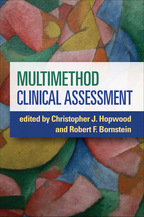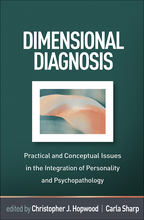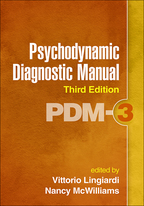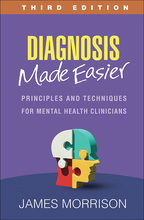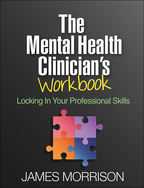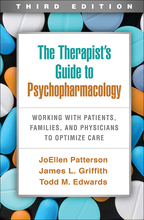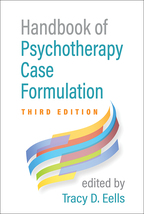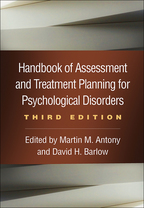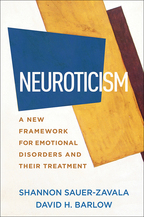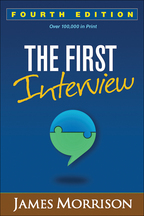Multimethod Clinical Assessment
Edited by Christopher J. Hopwood and Robert F. Bornstein
Hardcovere-bookprint + e-book
Hardcover
orderJune 18, 2014
ISBN 9781462516018
Price: $75.00 476 Pages
Size: 6⅛" x 9¼"
“The editors and contributors do an excellent job of documenting the benefits of multimethod assessment. The book identifies and reviews validating evidence for the assessment methods most commonly used in personality description, differential diagnosis, and treatment planning and outcome evaluation. Chapters provide instructive guidelines and case illustrations for combining interview, test, observational, and informant data to generate incremental validity and increase the predictive power of clinical assessments. This book makes a valuable contribution.”

—Irving B. Weiner, PhD, ABPP, Department of Psychiatry and Neurosciences, University of South Florida
“This is an unusually rich and masterful volume, with contributions from numerous authorities in the assessment field. Hopwood and Bornstein have succeeded in outlining the need for a multimethod approach and in providing clear guidance on how to implement such an approach in the clinic. This important book is well suited to graduate courses in assessment and is an indispensable addition to any practitioner's library.”

—Robert F. Krueger, PhD, Distinguished McKnight University Professor, Department of Psychology, University of Minnesota
“Hopwood and Bornstein have tackled one of the monumental challenges in clinical psychology—the problem of applied assessment. Taking issue with the field's increasingly narrow, problem-focused practices based solely on diagnosis and so-called 'gold standard' instruments, they argue that multitrait, multimethod assessment encompassing the whole person should become the minimum standard. Addressing a diverse range of topics, the contributors show that both convergences and divergences among multiple assessment methods need to be understood in order to develop a full picture of the help-seeking client. The book is organized within an integrative, cross-theoretical framework that provides practical support for effectively carrying out multimethod assessment.”

—Gary Brown, PhD, Psychology Department, Royal Holloway University of London, United Kingdom
“A wonderful book. It provides a framework for a contemporary approach to assessment that advances the field. The focus is on the value of multimethod assessment of individual differences in domains relevant to treatment planning. The editors and contributors are experts in research and clinical applications whose chapters are of high quality. Essential reading for practitioners, graduate students, and scholars interested in assessment.”

—Sandra W. Russ, PhD, Department of Psychological Sciences, Case Western Reserve University
“This unique and important book addresses the vexing question of how to integrate data across multiple methods of assessment, when the constructs being measured typically disagree. Distinguished experts from a wide range of applied assessment areas thoroughly review the research evidence on cross-method agreement (and disagreement) in their domains, offer insightful models for considering the unique information provided by different methods, and apply their insights to illuminate individual cases. The result is an invaluable guide for all clinicians and researchers who seek to understand people in their full complexity.”

—Gregory J. Meyer, PhD, Department of Psychology, University of Toledo
—Irving B. Weiner, PhD, ABPP, Department of Psychiatry and Neurosciences, University of South Florida
“This is an unusually rich and masterful volume, with contributions from numerous authorities in the assessment field. Hopwood and Bornstein have succeeded in outlining the need for a multimethod approach and in providing clear guidance on how to implement such an approach in the clinic. This important book is well suited to graduate courses in assessment and is an indispensable addition to any practitioner's library.”
—Robert F. Krueger, PhD, Distinguished McKnight University Professor, Department of Psychology, University of Minnesota
“Hopwood and Bornstein have tackled one of the monumental challenges in clinical psychology—the problem of applied assessment. Taking issue with the field's increasingly narrow, problem-focused practices based solely on diagnosis and so-called 'gold standard' instruments, they argue that multitrait, multimethod assessment encompassing the whole person should become the minimum standard. Addressing a diverse range of topics, the contributors show that both convergences and divergences among multiple assessment methods need to be understood in order to develop a full picture of the help-seeking client. The book is organized within an integrative, cross-theoretical framework that provides practical support for effectively carrying out multimethod assessment.”
—Gary Brown, PhD, Psychology Department, Royal Holloway University of London, United Kingdom
“A wonderful book. It provides a framework for a contemporary approach to assessment that advances the field. The focus is on the value of multimethod assessment of individual differences in domains relevant to treatment planning. The editors and contributors are experts in research and clinical applications whose chapters are of high quality. Essential reading for practitioners, graduate students, and scholars interested in assessment.”
—Sandra W. Russ, PhD, Department of Psychological Sciences, Case Western Reserve University
“This unique and important book addresses the vexing question of how to integrate data across multiple methods of assessment, when the constructs being measured typically disagree. Distinguished experts from a wide range of applied assessment areas thoroughly review the research evidence on cross-method agreement (and disagreement) in their domains, offer insightful models for considering the unique information provided by different methods, and apply their insights to illuminate individual cases. The result is an invaluable guide for all clinicians and researchers who seek to understand people in their full complexity.”
—Gregory J. Meyer, PhD, Department of Psychology, University of Toledo

